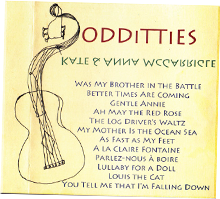Posted December 24th, 2010 by Anna
Read the whole article. NYT MAGAZINE: THE LIVES THEY LIVED.

(Anna) & Kate McGarrigle
KATE MCGARRIGLE
B. 1946
HEART SONGS
After a broken marriage, she wrote music of love and loss.
By NICHOLAS DAWIDOFF
IN THE LATE 1980S, if you were lying in bed one weekend morning, reading an article dedicated to the best rock ’n’ roll albums of all time, toward the back, long past “Born to Run,” “Highway 61 Revisited” and “Exile on Main Street,” there were quieter masterpieces, maybe even one that a fairly dedicated participant in the age of record shops had never heard of, like Kate and Anna McGarrigle’s self-titled 1976 debut. Part of the pleasure of hurrying off to buy and then play it was the special frisson that comes with listening to a great album that you sense a relatively small number of people know about; it feels more yours. This is especially true when the music is as intimate and vulnerable as the five songs Kate wrote for that album. She was not yet 30 when “Kate and Anna McGarrigle” was produced, but she described the stages of an unhappy marriage so vividly that they took on transcendent qualities; she seemed somehow to be thinking back across an entire life she had still to live.
McGarrigle was making music out of her own youthful disappointments. In 1969, after studying engineering at McGill University, she left her home in Montreal for New York City to become, says her sister Anna, “the character she wanted to be.” She, Anna and a third sister, Jane, had spent most of their childhood in what Kate’s son, Rufus Wainwright, calls “a very odd, out of the way place” — the Quebec mountain village of St. Sauveur. Raised by older parents and schooled in choral masses by French Catholic nuns, Kate had a yester year quality even in girlhood. She learned traditional American “heart songs” out of a book she found around the house and taught herself to play banjo by plucking along with Appalachian string-band records. Displaced persons who left Europe after World War II also lived in St. Sauveur, some of them bohemians wearing berets, others with concentration-camp tattoos on their arms, and Anna says that because of them, Kate developed an outsider’s sense that the heat of life was happening elsewhere. “She saw herself as one of those people who had to move on, to get out,” Anna says.
On her own in her early 20s in New York, Kate began to sing in Greenwich Village clubs, where she cut an ethereal figure, a puckish black-haired beauty with a striking mark above her lip and a singing voice that, with its melodic French-tinged intonation and absence of vibrato, conveyed an effortless emotion. Among the smitten was the singer-songwriter Loudon Wainwright III, who described Kate as “a wild and crazy swingin’ folk chick.” They wed in 1971, had Rufus and a daughter, Martha, and then Kate sent word to Canada that the marriage was ending and she and the children were coming home. Rufus’s first memory is his mother packing the U-Haul by herself for the long drive to Montreal.
‘God knows I love songs about mothers.’
“She was one way when she went down, and she came back almost a broken woman,” Anna says. “She came back in the summer of 1976, two months after her daughter was born. I think Kate got blinded by the whatever it was and got burnt. She had written songs before that. Cheerful, romantic songs. Not about life. She got a big taste of life.”
As the marriage unraveled, Kate, in New York, and Anna, in Montreal, had become recording partners, sending tapes back and forth. “Kate and Anna McGarrigle” is a musical conversation between sisters. There are wry lyrics sung in French; a traditional spiritual that counsels caution about whom you trust; Anna’s love-wrecked classic “Heart Like a Wheel”; a black-and-white cover photograph that looks like something borrowed from their mother’s dresser top; and Kate’s song cycle. It begins with the intoxicating early stages of wanting “to kiss you till my mouth gets numb” in “Kiss and Say Goodbye”; through the he-loves-me-not, he-wants-me-back confusion of “Blues in D”; “(Talk to Me of) Mendocino,” Kate’s wistful evocation of someone in uncertain motion yearning for stability; and the bitter end in “Tell My Sister” and “Go Leave.” There’s the feeling of a private person letting you in on something. Kate’s devastating portrait of a vibrant young woman who has come to feel prematurely old is the fullness of experience distilled as only a virtuoso songwriter can.
The critic Robert Christgau called this debut “a folkie apotheosis.” Popular singers, including Linda Ronstadt, Maria Muldaur and Emmylou Harris, covered early McGarrigle songs. There was the possibility of big American careers for the sisters. They did make several more excellent albums over the years and often sang in Carnegie Hall, but there was always an elusive element to Kate’s relationship with ambition, the wariness of again getting close to anything too bright.
Part of it was life as a single parent. “When you’re a woman,” Anna says, “what happens when you have children to raise and feed is you have 10 minutes while the potatoes are boiling to run to the piano and turn on the cassette tape.” Martha Wainwright recalls a dedicated mother who strictly monitored math homework and, despite modest means, “was always on time with her credit-card payments.” Kate’s singular sense of style was such that her children always believed their mother wore couture — until after her death when they cleaned out her closet and discovered all the discount labels.
Another reason for Kate’s intermittent musical career was the way competing artistic inspirations would “possess her,” Rufus says, “almost to a point of mania.” If she was baking cookies, Kate made hundreds of gingerbread skis that replicated, right down to the intricately sugared bindings, those she learned on as a girl in the Laurentian Mountains. If Kate was knitting Norwegian sweaters, these, too, were produced in profusion, with the traditional snowflakes whimsically arrayed across woolen skies all her own. People close to Kate McGarrigle describe a woman radiant and blunt, and you can see it in those sweaters. “Today people prefer soft wools,” Martha says. “She liked only scratchy Quebec wool. She liked the pain of it. She was always slightly dubious about people who wouldn’t wear scratchy sweaters.”
photo: Gail Kenney
2 Comments »
Posted December 21st, 2010 by Anna
A lovely tribute from Rufus to Kate in Time Magazine. It is a hard time of year. She held on through last Christmas, leaving her bed temporarily to great old friends, Michèle Forest, Jack Nissenson and Peter Weldon, all of whom we sang with in the Montreal coffee-houses of the 1960s. We sat around the fireplace in St Sauveur and sang a couple of the old songs. It think it was during Shenandoah that Kate looked at Jack and said, ‘you’re making me cry.’ She wasn’t the only one.

3 Comments »
Posted December 14th, 2010 by Anna
I attempted to reply to your comments but the server put my comments (imagine?) in the spam box for me to moderate which i’ve done but now they’re not lined up with emails I was answering. That would explain the proliferation of comments by Anna. I haven’t lost my mind but I am losing my temper.
3 Comments »
Posted December 12th, 2010 by Anna
 A collage Lil and Syl made from stills of the video shot on the night of the very first McGarrigle Christmas Hour concert at le Théâtre Outremont, Montréal QC on Dec 17, 2005. There were two shows that night. This was the original ‘A Not So Silent Night’ but the video and sound were a little on the folksy side and would have required some effort to bring it up to scratch, though the spirit was all there. I’m hoping that in the coming year, with some help, it can be pulled together, ski biscuits and all. I love the time code.
A collage Lil and Syl made from stills of the video shot on the night of the very first McGarrigle Christmas Hour concert at le Théâtre Outremont, Montréal QC on Dec 17, 2005. There were two shows that night. This was the original ‘A Not So Silent Night’ but the video and sound were a little on the folksy side and would have required some effort to bring it up to scratch, though the spirit was all there. I’m hoping that in the coming year, with some help, it can be pulled together, ski biscuits and all. I love the time code.
2 Comments »
Posted December 4th, 2010 by Anna
how kind of me. thank me so much.
8 Comments »
Posted November 30th, 2010 by Anna
The Pirelli Tires 2011 calendar is all about the gods. Karl Lagerfeld designed it. Here’s Julianna Moore as Hera. I think Kate would like this. 
Go home to Hera now.

One year ago today. December 9, 2009. First and last performance of Proserpina by Kate McGarrigle.
Kate McGarrigle, Proserpina (Not So Silent Night, Royal Albert Hall), December 9, 2009 from Lys on Vimeo.
Thanks to Lys who posted this video.
A piece written by Sean Michaels on Jan 21 of this year. Sean has picked Proserpina as one of his favorite songs for 2010.
His blog is said the gramophone
FOR KATE MCGARRIGLE
by Sean
Please note: MP3s are only kept online for a short time, and if this entry is from more than a couple of weeks ago, the music probably won’t be available to download any more.
Kate McGarrigle – “Proserpina (live at Royal Albert Hall)”.
This is a very sad song. There are a few reasons it’s here.
First, because Kate McGarrigle is alive again, every time I listen. “Proserpina” was recorded in London less than two months ago; she is joined by family, surrounded by friends. Her son, Rufus Wainwright, called the Royal Albert Hall show “the greatest performance of her life”. There she is, right there, singing as she’s always sung, or perhaps even better, a voice of wildflower and thorn. She sings with her sister, Anna, and her children, and her niece; her new grandson, scarce weeks old, squirms in a hospital not far away. Even from there, I am certain, he can hear the harmonies.
I also share this song because it was a new one, written by Kate at the end of her life, toward the end of a long illness. Yet this is not a song of the expiring, of the slowing heart: it’s a work of strong beauty, of brave melody and deft singing, with (dare I say it) a magnificent hook. “Proserpina” is not about falling away, but about coming home.
And she sings it triumphantly. She is already very, very sick and yet still she is Kate, wry and caring, unflinching. Earlier in the concert, she describes the story of Proserpina, of Persephone – a grim legend. Someone in the crowd calls out, (warmly but) sarcastically: “Merry Christmas!” For Kate there is no flutter of hesitation or embarrassment: there is only laughter. She and the whole great room laugh. As the McGarrigle sisters have always known, these things (sorrow, joy) go together.
Now, with streets swept of snow, with too much sadness in this city’s new young year, I listen to both the sad songs and to the happier ones. We all strain to hear the harmonies.
goodbye, Kate McGarrigle
(We’re very glad to still have you here, Anna.)
Posted by Sean at January 21, 2010 11:06 AM
COMMENTS
Stunning performance and a beautiful tribute. But wasn’t it recorded at the Royal Albert Hall? We don’t have a Carnegie Hall in London.
Posted by Alan at January 21, 2010 1:19 PM
Thanks for catching my mistake, Alan.
Posted by Sean at January 21, 2010 1:47 PM
Thanks for this, Sean. Moving song. Rest in peace.
Posted by David at January 21, 2010 3:13 PM
i think it’s actually rufus who calls out “merry christmas!”.
Posted by Nadyne at January 21, 2010 11:06 PM
of course it’s rufus who sarcastically says Merry Christmas. that’s so his style. 🙂
thanks for posting this beautiful song. Kate McGarrigle will be missed, but thank goodness we still have her music.
Posted by ebs at January 22, 2010 5:14 PM
thats beautiful
Posted by mojgani at January 23, 2010 12:02 PM
beautiful!
Posted by ru at January 23, 2010 3:14 PM
Thank you so much for the mp3 of this song. I have fallen in love with it. And with Kate over and over again every time I listen to it. Heartbroken. Truly a loss. She was one of the better ones.
Posted by Leila at January 23, 2010 4:18 PM
So beautiful…so wonderful…ethereal beauty before us…singing.
Posted by Lindy Winnell at March 10, 2010 1:21 AM
Sean, I changed computers and lost my mp3 of Proserpina. Would you send it to me? I am devastated to not have that song. It seems to be impossible to find anywhere. Thanks for your original generosity – and here’s hoping it can be repeated. If not, no worries. Leila
Posted by leila at October 23, 2010 10:25 PM
Hi – Found your site while searching for a download of Kate’s “Proserpina”. Alas, the link has gone. Could you please email me if you can help? With thanks, Robert
Posted by Robert at November 13, 2010 3:56 AM
3 Comments »
Posted November 24th, 2010 by Anna

Josh Groban – Au jardin des sans-pourquoi Kate and Rufus did the lyrics for this melody by Josh Groban. Kate was recuperating after complications from an rfa. Josh’s melody arrived. She deconstructed it and adapted it to her piano style which she played on the old Blüthner. She scribbled and conferred with Rufus. They made a demo of it and returned it to Josh. Very beautiful. It’s on Josh’s latest oeuvre Illuminations. Thanks JG.
1 Comment »
Posted November 21st, 2010 by Anna

Kate’s family and my family lived in mirror apts. on deMaisonneuve W. in Westmount. Dane snapped this pic of Rufus and Martha (Pounie) on January 10, 1978. Rufus is 4 and Martha is not yet 2. Congratulations and love.
4 Comments »
Posted November 12th, 2010 by Anna

Martha has finally released her Sans fusils, ni souliers à Paris on itunes US. You’ll be buying directly from the artist if you click here. Martha’s Piaf Record

And the Mittenstrings have released Five an ep of studio versions of 4 songs from the original 2009 sitcom soundtrack plus 1 new song.
4 Comments »















